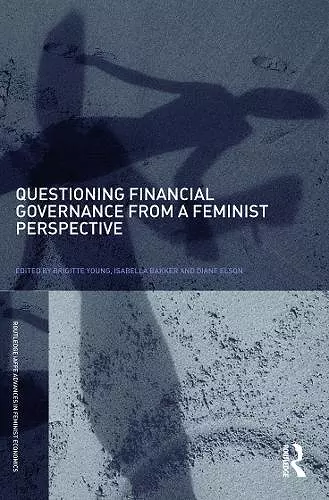Questioning Financial Governance from a Feminist Perspective
Analyzing Gender Bias in Fiscal and Monetary Policies
Brigitte Young editor Diane Elson editor Isabella Bakker editor
Format:Paperback
Publisher:Taylor & Francis Ltd
Published:29th Jul '11
Currently unavailable, and unfortunately no date known when it will be back
This paperback is available in another edition too:
- Hardback£160.00(9780415676694)

This insightful book explores the intersection of gender and financial governance, revealing biases that impact women and perpetuate inequality. Questioning Financial Governance from a Feminist Perspective is a vital resource for scholars in related fields.
The book Questioning Financial Governance from a Feminist Perspective brings together a diverse group of feminist economists and political economists from North America and Europe. Their collective aim is to scrutinize the 'strategic silence' surrounding gender issues in fiscal and monetary policy, as well as financial regulation. This silence often leads to the misconception that financial governance tools are gender-neutral, masking their actual implications for women and perpetuating gender inequality.
In Questioning Financial Governance from a Feminist Perspective, the authors delve into the transformations in financial governance that occurred prior to the financial crisis, alongside various dimensions of the crisis itself. These transformations highlight the interplay between private and public power, involving institutions at local, national, regional, and global levels. A significant focus is placed on policy rules that constrain the discretion of national policymakers regarding fiscal and monetary strategies, revealing inherent biases that produce gender, class, and race-based outcomes.
The originality of this work lies in its emphasis on macroeconomic policies and financial governance through a feminist lens, examining aspects such as GDP fluctuations, paid employment, and government expenditure. The findings underscore that financial governance instruments are not gender-neutral, with each chapter illustrating how financial governance intersects with the gender order, labor divisions, and power dynamics. This book is essential reading for those engaged in feminist economics, macroeconomics, political economics, and women's studies.
"For those who seek concrete case studies and empirics on the effects of financial governance on gender inequality, this important book amply fills that niche. Engaging and accessible, the authors present rigorous and novel analyses on how financially-related policies, ranging from taxation to monetary and fiscal policy to credit allocation, serve to reinforce unequal gender relations. For policy makers, the book serves as a useful jumping off point for the development of policies that can promote broadly shared, gender-equitable well-being. This timely collection of essays succeeds in capturing notable gender effects of financialization in evidence in both developed and developing economies".
- Stephanie Seguino, Professor of Economics, University of Vermont, USA and President of International Association for Feminist Economics.
"This volume provides a unique contribution to the academic and policy debates around the financial crisis. It develops sound economic explanations in empirically-based analyses of how neoliberal financial policies disadvantage women. The volume convincingly shows the gender biases inherent in, for example, contractionary inflation targeting, and individualising risk combined with bank bail-outs, corporate tax competition, and underinvestment in (women's) food production. The volume demonstrates how important a feminist perspective is for raising effectiveness as well as equity of financial policies".
- Irene van Staveren, Professor of Pluralist Development Economics, ISS, The Hague.
"This book provides a much-needed intervention that successfully interrupts, interrogates and deconstructs the omission of gender in financial governance. Bringing together some of the best scholarship in feminist political economy and feminist economics, this rich and innovative collection allows us to understand the impact of the strategic silence with regard to gender inequality before and after the Great Crash of 2008".
- Susanne Soederberg, Professor and Canada Research Chair, Department of Global Development Studies & Political Studies, Queen’s University, Canada
ISBN: 9780415676700
Dimensions: unknown
Weight: 317g
184 pages